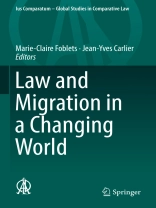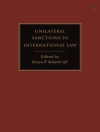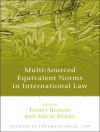This volume comprises national reports on migration and migration law from 17 countries representing all continents. The vast majority of these are countries of immigration, which means they face specific challenges in terms of managing migratory flows that are increasingly linked with climate change and scarce natural resources worldwide, and they need to find viable ways to integrate humanitarian migration. Unlike so many recent publications in the field of international migration law, this book brings together reports on diverse countries that are rarely regarded as part of one and the same picture, depicting globalized migration in the contemporary era that to a large extent challenges state sovereignty. The contributions delineate the legal regimes that individual states are continually developing and modifying with a view to managing and controlling access of individual persons to their respective territories. They also show how the restrictive measures that states resort to in the event of failure to manage migration could have a lasting legal impact.
The General Report preceding the country reports provides a comparative overview of the national reports, and is divided into two parts. The first, more technical in nature, addresses the classic questions relating to admission to and residence in a country. The second, more reflective section, examines the relationship between laws and migration in a wider and multidisciplinary perspective. To allow a robust comparison, the country reports all follow a similarly wide-ranging structure; to the extent possible, they also cover the historical, sociological and demographic factors that help explain legal regimes and migratory flows in each country. Each country report includes analyses of recent legislative developments and delicate questions that are still awaiting adequate (legal) responses as well as perspectives for the future.
Tabela de Conteúdo
Migration Law and Policy on the Road to Redemption: Hostile Identity Politics v. Individual Rights and Socioeconomic Benefits.- Law and Migration in a Changing World.- General Report.- Selective Generosity: Migration Law and Policy in Australia.- Migration Governance in a Fast-Evolving Legal Environment: The Case of Belgium.- Human Smuggling under Canadian Refugee Law: Protecting a System, not Persons.- Over-normativity in Search of a Balance between Migration Control and Migrant Rights in Croatia.- The Danish Legal Framework for Migration: Between Progressive Humanitarianism and a Restrictive Present.- Migration and Statelessness in the Dominican Republic from a Human Rights Perspective.- Germany’s Fragmented Migration Management within the European Framework.- Greek Migration Law and the Challenges of Europeanization and Internationalization.- Law and Migration in the World’s Gambling Haven: The Uniqueness of the Macau SAR (China) and Its Migration Reality.- Quo Vadis? Some Reflections on Malta’s Migration Management Trajectory.- In the Waka of Kupe: the Long Journey to Aotearoa New Zealand.- Norway: Challenging Human Rights Law.- Stratified Migration: Differentiated Rights and Privileges of Economic Migrants in Singapore.- Above the Law: Securitization in South Africa’s Migration Management Regime.- Immigration Law and Policy in Switzerland: Between Restrictive Controls and Freedom of Movement.- The Stratification of Rights and Entitlements – Access to Residency, Welfare and Justice by Migrants in the UK.- Migration Law in Venezuela and Its Applicability in the Context of an Authoritarian Regime.
Sobre o autor
Prof. Dr. Marie-Claire Foblets is managing director of the Max Planck Institute for Social Anthropology and the director of the Department of Law & Anthropology, which she founded in 2012. She is also Professor of Law at the University of Louvain (KUL) and an Honorary Professor at the Martin-Luther-University of Halle-Wittenberg. She has been teaching law as well as social and cultural anthropology at the universities of Antwerp and Brussels for over twenty years. Before becoming a member of the Max Planck Society in March 2012, she was professeur ordinaire (full professor) at the Catholic University of Leuven, where she headed the Institute for Migration Law and Legal Anthropology. She has also been a member of various networks of researchers focusing either on the study of the application of Islamic law in Europe or on law and migration in Europe, including the Association française d’anthropologie du droit (AFAD), where she served as co-president for several years. In2001, Professor Foblets was elected to the Royal Flemish Academy of Belgium for Science and the Arts (KVAB). In 2004, she received the Francqui Prize, the most distinguished scientific award in the humanities in Belgium.
Prof. Dr. Jean-Yves Carlier is Professor of Law at the University of Louvain (UCL) and at the University of Liège in International Private Law, European Law, Human Rights Law and Migration Law. He is a highly esteemed scholar who has published extensively in the field of human rights, international private law and personal autonomy. He has been teaching in the capacity of visiting professor at Paris 2 (Panthéon-Assas), Caen, Strasbourg, Aix-Marseille, Montréal, Den Hague Academy of International Law, Rabat, Tunis, Ouagadougou, Cotonou, Bujumbura and Bukavu. He is also a practicing lawyer as the member of the bar in French speaking Brabant (Nivelles, Belgium).












